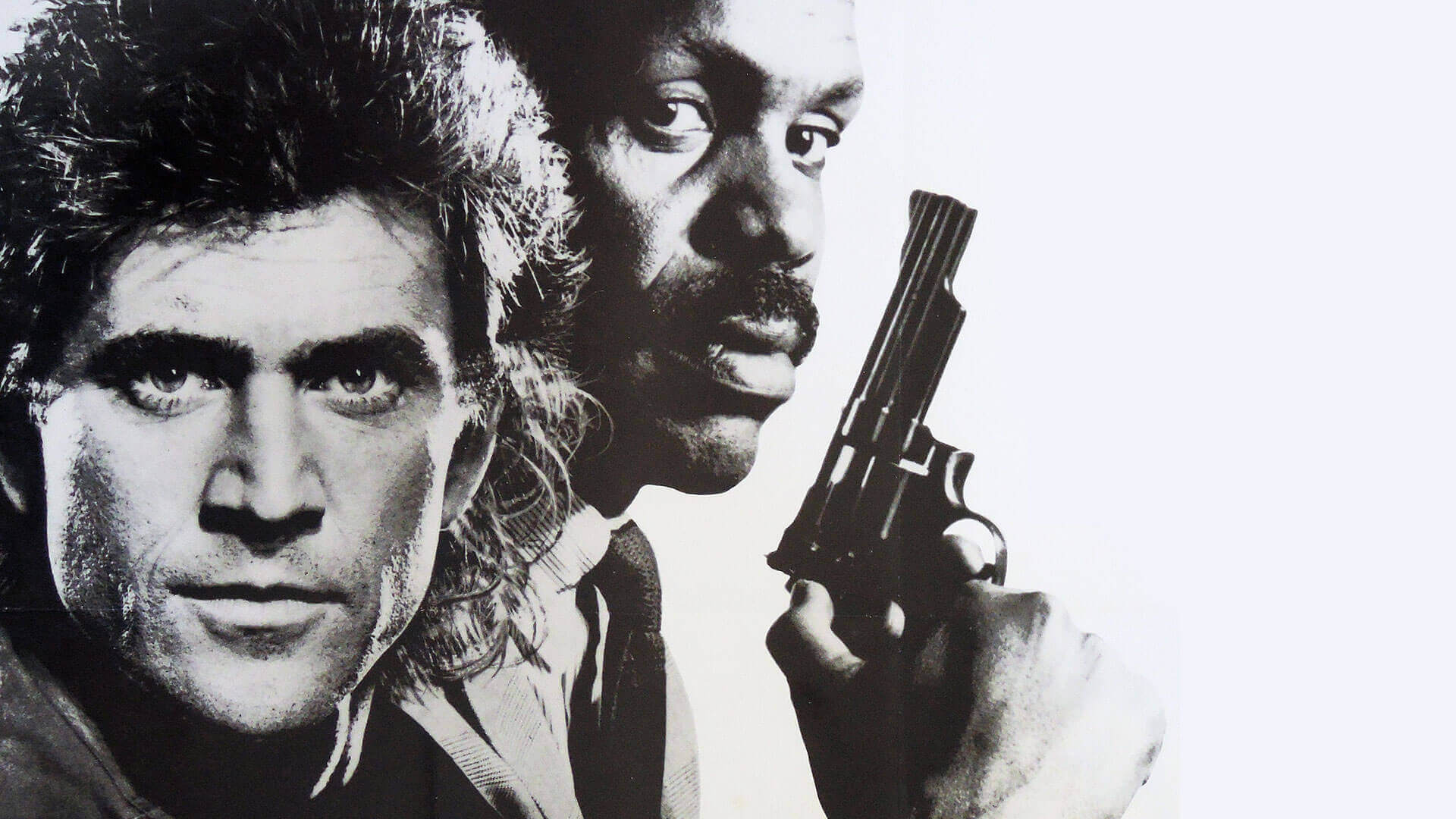Lethal Weapon is the Perfect Christmas Movie
I love Christmas movies. As soon as the Christmas Season starts (noon on Thanksgiving, officially), I begin watching them, and my playlist grows each year as I see more I like. I watch all kinds: venerable classics like It’s a Wonderful Life and Miracle on 34th Street; modern favorites like Home Alone and Love Actually; light comedies like Elf and black comedies like Bad Santa; action movies like Die Hard and its first sequel (stay tuned to GeeksGamers.com if you’re a fan of those – and who isn’t?); horror movies like Gremlins; and I always have a Shane Black night or two. But every year, the one movie I save especially for Christmas Day is Lethal Weapon.
I love Lethal Weapon for many reasons, but aside from its status as an action classic, Shane Black’s debut and probably the best buddy cop movie ever, it’s the emotions it evokes that stick with me the most, and those are what make it such a great Christmas movie (and that’s what I mean by my title; I’m not arguing that Lethal Weapon is The Best Christmas Movie Ever™ – as if such a thing even exists – just that it works perfectly well as a Christmas movie). In the end, Lethal Weapon is about the loneliest man on Earth becoming part of a family just when he’s lost all hope of ever loving – or being loved – again.
*Spoilers*
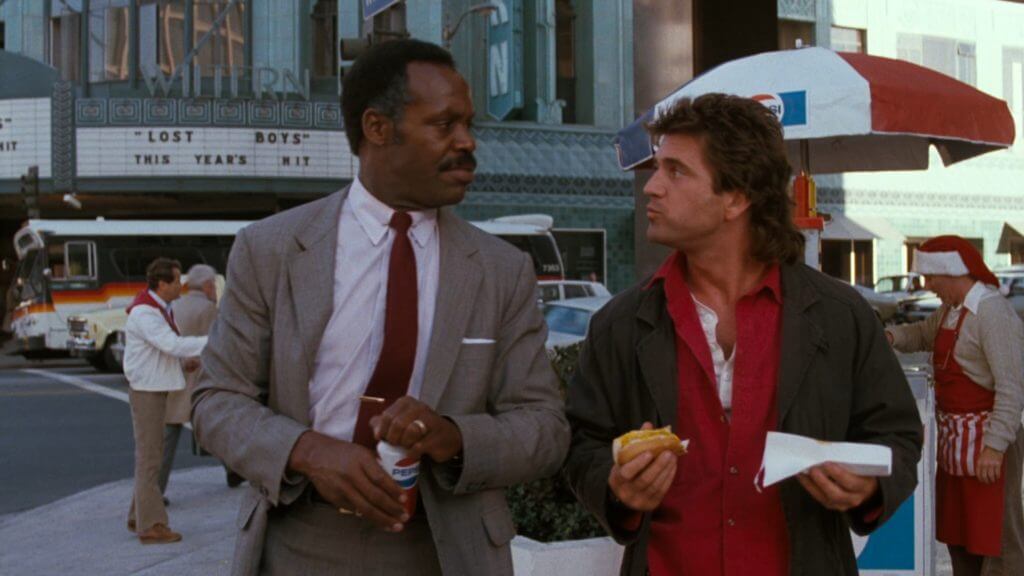
When we first meet Martin Riggs (Mel Gibson), he’s alone. He wakes up in his trailer with a cigarette in his mouth and drinks himself a good-morning beer with only his dog for company. He doesn’t even bother to get dressed, because what’s the point? We soon learn from the police department psychologist (the late Mary Ellen Trainor, a Richard Donner favorite who also appears in Die Hard) that Riggs has recently lost “his wife of eleven years” to a car accident, and all of Riggs’ behavior in the opening scenes paints an ugly picture of a man with nothing to live for. He puts himself in danger when busting some drug dealers at a Christmas Tree lot, imploring his fellow officers to shoot through him to get the punk holding him hostage and even goading the criminal to shoot him and end it, then having to be talked down from blowing the guy’s head off once Riggs gets the upper hand. One of the detectives tells him, “It’s not worth it,” but Riggs barely hears him, so consumed with rage and hurt is he.
When next we see Riggs, he’s in his trailer again, drinking as a Looney Tunes Christmas special is on the television. Tears in his eyes, hugging his wedding picture, Riggs puts his gun in his mouth, ready to finally end his misery; he’ll later reveal the bullet to be specially selected for his death, “with a hollow point, look, make sure it blows the back of my goddamn head out, do the job right” – this bullet becomes the symbol of his death wish. The juxtaposition of the impending suicide with the cartoon is perfect; while the world around him is happy and cheerful, celebrating a holiday of peace, joy and love, Riggs feels only pain. (The scene also begins with a group of kids riding their bikes together, further illustrating Riggs’ isolation.) Amidst a stream of tears, he lowers the gun, telling his wife he misses her and he’ll see her “much later.” He’s conquered his despair this time, but who knows how many more lonely nights he can take?
In between the Riggs scenes, we also meet Roger Murtaugh (Danny Glover), a fellow detective. Unlike Riggs, Murtaugh has everything to live for. He’s got a family that loves him, the respect of his colleagues (note how many people, including random uniform cops, wish him a Happy Birthday in the beginning, and even call him “Rog” as opposed to “Detective Murtaugh;” also, Murtaugh is apparently one of those unlucky folks whose birthday falls right before Christmas), and lifelong friends dating back to the Vietnam conflict. Michael Hunsacker, his war buddy, even saved Murtaugh’s life in the war by taking “a bayonet in the lungs;” while Riggs has nobody he can even talk to, Murtaugh’s had people willing to give their lives for him. (Contrast this story to Riggs, who was a Special Forces sniper in Vietnam, spending the war alone, killing from afar.) Murtaugh’s biggest worry is whether his daughter’s New Year’s Eve outfit is too revealing, while Riggs struggles with finding a reason to live.
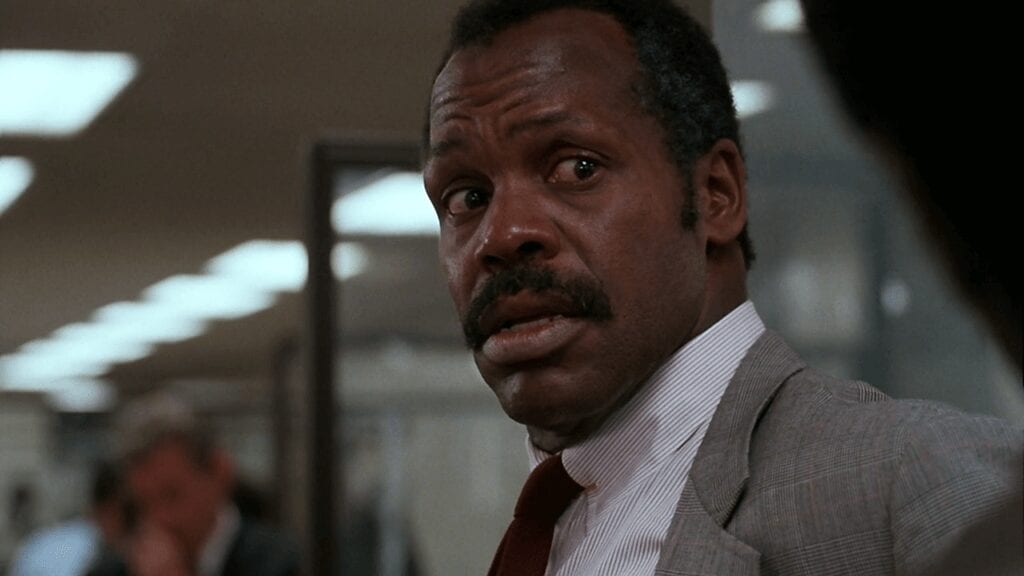
When the two are partnered up, Murtaugh is immediately distrustful of Riggs; he takes one look at him and assumes he’s a criminal. At the same time, from Riggs’ perspective, Murtaugh comes charging into his life seemingly out of nowhere and, when the misunderstanding is revealed, brings a smile to Riggs’ face. This is the first sign of the turn Riggs’ life is about to take.
As they begin to feel each other out, Murtaugh asks Riggs questions about his past, the two compare guns (a Beretta with a whole lot of bullets vs. a conservative revolver), and Murtaugh decides Riggs is dangerous, deriding him as a “lethal weapon.” And after Riggs’ next act of recklessness – handcuffing himself to a man contemplating suicide and jumping off the building with him (another sign of his misery; when faced with someone else’s suicide, Riggs not only shows he’s more willing to die than he, but can’t even dredge up a convincing reason for the guy to step off the ledge) – Murtaugh insists on knowing for sure whether Riggs is really suicidal himself, handing Riggs his gun and daring him to pull the trigger. This act in itself is another instance of how different they are, and how much they’ve got to lose; Murtaugh’s actions may seem callous, but he’s a guy with everything to live for and needs to know how much danger he’s in with Riggs by his side.
And then, in a taste of what’s to come, Riggs does pull the trigger, and Murtaugh stops the gun from firing. In this scene (which is also where Riggs shows Murtaugh – and the viewer – the hollow point bullet), Riggs reveals the reason he comes up with “every single day” to stay alive is “doing the job.” This is a tenuous-at-best reason to live, as Riggs’ job is very dangerous and all his co-workers are either afraid of him or hold him in contempt for what they believe is faking his condition “to draw a psycho pension.” To demonstrate this point, when faced with his latest partner distrusting him and the grim vision of “the job” that denotes, Riggs decides to end it; Murtaugh stops him, not as a cop but as a man who doesn’t want Riggs to die, showing genuine concern for him.
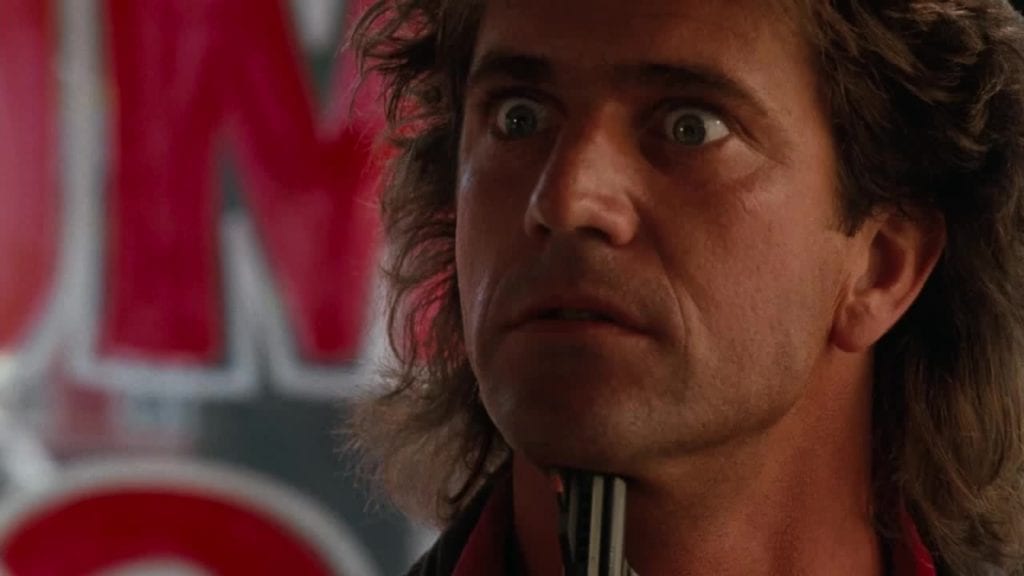
Murtaugh, reasonably, is freaked, and he keeps Riggs at arm’s length… right up until Riggs saves his life from a trigger-happy drug dealer. Now Murtaugh has the chance to see another side to Riggs; he isn’t just the psycho who may get him killed, but a good man who, deep down, does care about others (likely the part of “the job” he clings to). So, instead of continuing to push him away, Murtaugh invites Riggs to his home for dinner, and this is the movie’s true turning point.
At the Murtaugh home, Riggs speaks only when spoken to, preferring mostly to sit back and observe this family and how it works. Murtaugh goofs around with his kids, reminisces about how he met his wife Trish (Darlene Love), talks fishing, and gives Riggs the perfect portrait of a family. Riggs tells Trish about fishing with his father when he was a child, and the impression given is that his family is long gone, and now that his wife is dead so are his hopes of building a new one. But Murtaugh’s family evokes the joy and laughter he never thought he could have again, and as he sees his friendship with Murtaugh grow, Riggs wonders if maybe he can be a part of it too.
The very next day, Riggs’ demeanor has changed; he wakes Murtaugh up in his bed with a cup of coffee, something he likely never would have done before that dinner, indicative of Riggs becoming a fixture in the Murtaugh household. When they convene to the gun range to discuss their investigation, Riggs makes a crack about Trish’s cooking; when Murtaugh jokingly says, “Remarks like that will not get you invited to Christmas dinner,” Riggs responds with, “My luck’s changing for the better every day.” And Riggs isn’t joking; he’s starting to be happy, evinced when he shows off his pistol-shooting skills by making a smiley face on the paper target with bullet holes. Riggs, so recently ready to give up on life, is now happier than he’s been in a long time.
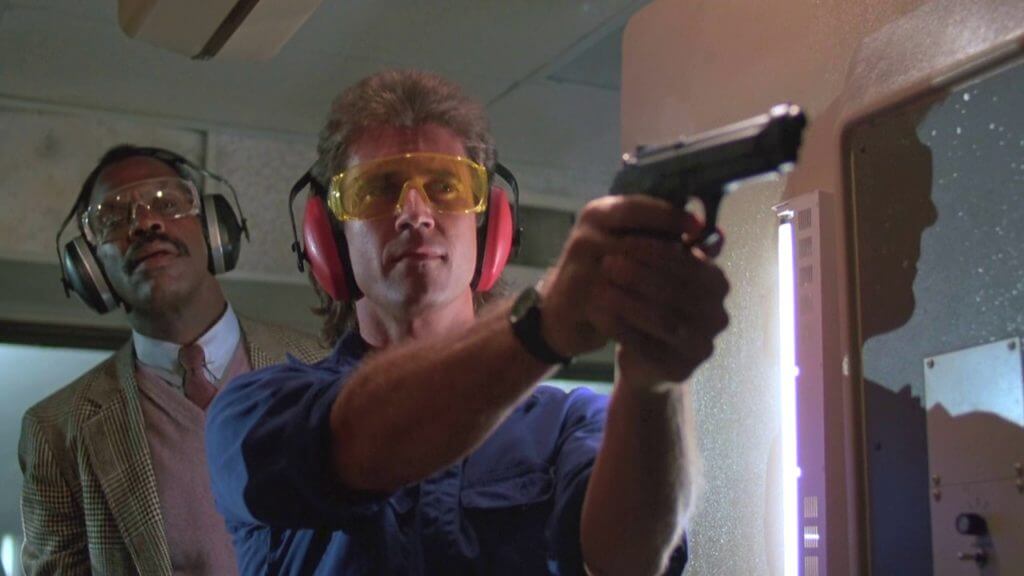
But it would be a pretty boring action movie if it were all smiles from here on out. Riggs and Murtaugh have some bad guys to fight, and as our heroes get closer to exposing the drug ring, General McAllister (Mitchell Ryan) and his lieutenant, Joshua (Gary Busy), retaliate by kidnapping Murtaugh’s oldest daughter Rianne (Traci Wolfe). The scene where they discover Rianne’s been taken is excellent; the immediate focus is on Murtaugh as he puts the phone onto the table, but then he fades into the background and Riggs steps forward, staring at the phone before slowly picking it up and putting it back in its cradle, not blinking once. Rianne, Trish, Nick and Carrie aren’t just Murtaugh’s family anymore. They’re Riggs’ family now, and he’ll be damned if he’ll let anyone take them away from him. In discussing their battle plans, it becomes clear that the things that once scared Murtaugh about Riggs are now the very things that will save his daughter. Just as Murtaugh and his family are what Riggs needs to survive, the exact thing they now need is a lethal weapon.
The fight to save Rianne is long and arduous, but Riggs sees them through it. When they’re captured, it’s Riggs who breaks free and rescues Murtaugh and Rianne, fighting for the family he now has and refuses to lose. When they enter the nightclub that serves as a front for the General’s heroin-dealing operation, Riggs immediately shoots the mercenary sitting at the bar, not hesitating for a second. Murtaugh takes Riggs’ cue and shoots to kill as well, never entertaining the thought of bringing the General in alive. (“No way you live; no way.”) And in the final battle with Joshua (on Murtaugh’s front lawn, at the site where his new family was formed), the scene from the Christmas Tree lot in the beginning replays itself, but in reverse – Riggs has the bad guy in his clutches and the entire police force, including Murtaugh, is encouraging him to kill Joshua. But Riggs instead lets him live, telling them, “He’s not worth it.” This time, Riggs chooses life of his own volition, because he finally has a reason to live. Riggs visiting his wife’s grave and finally letting her go, the delivery of the hollow point bullet – again, the symbol of his death wish – wrapped in a bow, Murtaugh welcoming Riggs to Christmas dinner, Riggs’ dog running right into the Murtaugh house like it owns the place, these are all confirmation, but the end of the fight is the moment when Riggs lets go of his pain once and for all, and it’s thanks to becoming part of Murtaugh’s family.
Because of its focus on family, on finding hope when adrift in loneliness, on having every heart find a home for the holidays, Lethal Weapon is awash in the Christmas Spirit. I’ll be watching this year on Christmas Day, as always, and I hope you’ll either watch it for the first time during the Season or decide to revisit it. Come for the neck snaps, stay for the heart.

